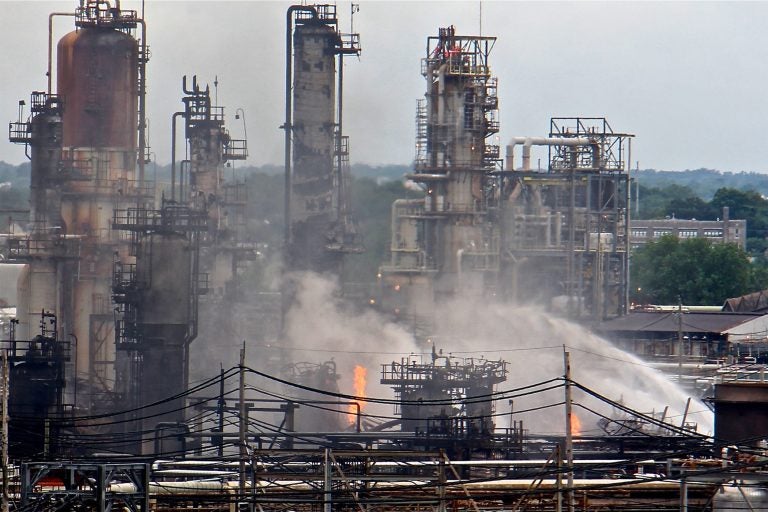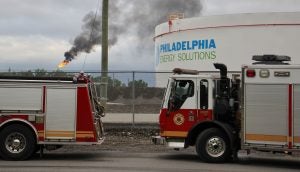The 1,000 refinery workers that were laid off deserve access to green energy jobs
PES and our elected officials must do more to make sure workers have the opportunity to develop new skills and find meaningful work in our country’s evolving energy sector.

A fire burns at the Philadelphia Energy Solutions refinery hours after a series of early morning explosions on June 21, 2019. (Emma Lee/WHYY)
The massive explosion at the Philadelphia Energy Solutions oil refinery late last month will have far-reaching consequences for years to come. But for workers at the refinery, the effects were far more immediate and definitive.
More than 1,000 full-time refinery workers and countless more specialty contractors and part-time employees were told they would be laid off just days after the explosion. These workers deserve better. PES and our elected officials must do more to make sure these workers have the opportunity to develop new skills and find meaningful work in our country’s evolving energy sector.
Environmental activists have long advocated for ending operations and safely remediating the 1,300 acres of the East Coast’s largest and oldest refinery. The site was a major environmental hazard and its operators’ refusal to consider the needs and wellbeing of the surrounding community was an ongoing environmental justice issue. Today, it’s abundantly clear that the site was also a major safety hazard.
We cannot forget that the refinery’s workers bore the brunt of these hazards.
While the residents of Eastwick, Grays Ferry and nearby neighborhoods suffered from asthma and other effects from poor air quality, workers suffered the same exposures. When the entire city felt the early-morning explosion, workers faced the greatest hazards and some suffered serious injuries.
And yet, when a dangerous leak was detected, those workers acted heroically and saved countless lives. Only at a site as dangerous as that refinery could the massive June 21 explosion and fire be considered a close call. The environmental and public health devastation could have been far worse had it not been for the bravery and fast actions of workers at the site.
Their reward for that commitment is to be unceremoniously dismissed from their jobs, without even the minimum notice required by law. It’s the latest and final straw in a long history of disregard for the health and wellbeing of workers at the refinery.
Those of us who pushed to close this dangerous site wanted better for these workers. Had the site been shut down in a proactive way, these workers could have planned a transition for their personal lives and their careers. They could have received training to move to safer, cleaner jobs. Instead, these workers face the remainder of the summer with uncertainties about their future employment and how they will support their families.
There are greener jobs are out there.
Clean energy jobs now outnumber fossil fuel work three-to-one, according to E2 data. The Bureau of Labor Statistics reports the two fastest-growing jobs in the country are in the solar and wind industries. An entire industry has built up around addressing climate change, including lowering methane emissions at natural gas facilities.
The energy industry, elected officials and unions must prioritize helping refinery workers adapt their skills to work in this new economy.
As a working group convened by the city meets on the fallout from the PES explosion, its focus will be on what’s next. What’s next for the refinery site? After decades of devastating industrial pollution and environmental neglect, it will take a comprehensive, transparent remediation effort to make the site suitable for continued use. What’s next for the surrounding community? Neighbors and the entire region deserve a say in what happens at the site. What’s next for Philadelphia? The explosion at PES tragically underscores our city’s need to transition to renewable energy. We can start by using the remediated refinery land as a site for innovation and manufacturing in support of our new green economy.
What’s next for these workers? As we navigate the overdue transition to safer, cleaner energy, it falls on all of us to make sure the PES refinery employees land on their feet. All workers who have risked their lives and their health supporting our nation’s increasingly outdated fossil fuel industry deserve a chance to develop new skills and play a vital role in the new direction our energy infrastructure must take.
WHYY is your source for fact-based, in-depth journalism and information. As a nonprofit organization, we rely on financial support from readers like you. Please give today.








